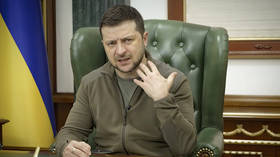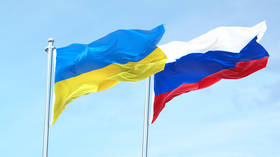Zelensky reveals Putin meeting goal

Ukrainian President Volodymyr Zelensky said in a video address on Sunday night that the main goal for Kiev’s negotiators is to pave the way for a direct meeting with his Russian counterpart, Vladimir Putin. He also hopes that the talks will lead to security guarantees.
“Our delegates have a clear task – to do all they can so the meeting between presidents takes place, the meeting I’m sure the people are waiting for,” he said in a video address published on the president’s official Telegram channel.
According to him, the goal of the negotiations is to obtain “effective” security guarantees, “not like in Budapest or like on our skies,” but guarantees about which the Ukrainian side could “say: this works, these are the guarantees.”
Ukraine signed the Budapest Memorandum on Security Assurances in 1994 along with Russia, the US, and UK, in which Ukraine joined the Treaty on the Non-Proliferation of Nuclear Weapons (NPT) and agreed to give up its own nuclear armaments, while receiving security guarantees from the other sides in return.
Ukraine claimed the treaty was breached by Russia in 2014 when the neighboring state “occupied” Crimea and the Donetsk and Lugansk republics – allegations that Moscow denied. In February, Zelensky claimed that the Budapest Memorandum no longer guarantees security to Ukraine, so the country can reverse its decision to not hold nuclear weapons.
Ukrainian officials have appealed to NATO and their allies to declare a no-fly zone over Ukraine in the wake of the Russian offensive since the first days of the conflict, which broke out in late February. Western leaders have rejected these requests due to fears that it would lead to a direct conflict with Russia and the US-led military bloc, since NATO aircraft would be forced to engage in fights and shoot down Russian planes in Ukrainian airspace.
The new round of peace talks between Russia and Ukraine is set to take place on Monday via video conference. According to the Russian side, there has been “significant progress” and the sides could soon come to an agreement and develop documents to sign, while a representative from Kiev said the two parties are approaching compromise and the Russian side is “already seeing things much more adequately.”
Moscow attacked its neighbor in late February, following a seven-year standoff over Ukraine’s failure to implement the terms of the Minsk Agreements, and Russia’s eventual recognition of the Donbass republics in Donetsk and Lugansk. The German- and French-brokered protocols were designed to regularize the status of the regions within the state of Ukraine.
Russia has now demanded that Ukraine officially declare itself a neutral country that will never join NATO. Kiev insists the Russian offensive was completely unprovoked and has denied claims it was planning to retake the two republics by force.














